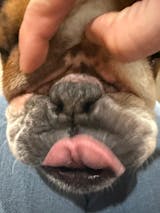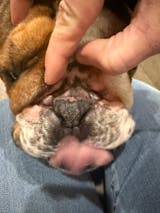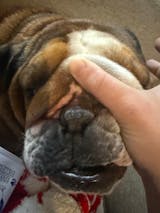10 Summer Safety Tips for Dogs: Keeping Your Furry Friend Cool!
It's summertime, which means it's time to enjoy the outdoors with your pup! It’s important to keep in mind that our furry friends are more likely to suffer from heat-related illnesses, and it's our responsibility to make sure they stay safe and healthy. We've put together a list of the top dog safety tips for summer, so you can enjoy the sunny season safely with your pup!

Early Signs of Heat Stroke:
Before diving into our tips, let's quickly go over the early signs of heat stroke in dogs. Be on the lookout for:
- Heavy Panting: Dogs regulate their body temperature through panting. When a dog pants, they inhale cool air and exhale warm air. The moisture from excessive drooling mixes with the exhaled warm air, further facilitating the process of heat exchange and cooling.
- Excessive Drooling: The act of drooling allows a dog's body to transfer some of the excess heat from their internal organs to the moisture on their tongue and gums. When the drool comes in contact with the air, it carries away some of the heat, helping to cool down the dog's body.
- Balance Problems: Heat affects a dog's nervous system by causing dehydration, leading to imbalances in electrolytes and blood flow. These factors can impact nerve function, leading to symptoms like balance problems and disorientation.
- Bright Red Gums: A dog’s gums may turn bright red due to increased blood flow as the body tries to cool down.
Advanced Signs of Heat Stroke:
If heat stroke progresses, more serious symptoms may appear, including:
- Labored & Noisy Breathing: Your dog may struggle to breathe normally, and it is important to take action to cool your pup down.
- White Gums: When a dog is overheated, blood vessels can constrict, reducing blood flow to the gums, causing them to lose their normal pink color.
- Lethargy: Your dog may become weak, disoriented, or collapse. As the body struggles to cool down, energy levels drop, and the dog may appear weak and fatigued.
- Vomiting: Elevated temperatures can lead to gastrointestinal distress, affecting the stomach's normal function. Additionally, dehydration and stress on organs may trigger the urge to vomit as the body tries to expel excess heat.
How to Cool Your Dog Down:
If you notice any of these signs, act quickly to cool your dog down. Some effective methods include:
- Spraying or Immersing your dog in Cool Water: Use a hose or immerse your dog in a shallow pool to bring down their body temperature.
- Draping Them with a Cool Towel: Wet a towel with cool (not ice-cold) water and drape it over your dog's body.
- Avoid Ice Water: Be sure to never use ice water when your dog is overheating, as it can constrict blood vessels and make the situation worse. Gradually decrease the temperature to avoid shock.
Summer Safety Tips for Dogs:
Now that we know how to recognize and handle heat-related issues, let's explore 10 essential summer safety tips for our furry companions:
- Avoid Prolonged Exposure on Hot Sand & Pavement: Hot surfaces can burn your dog's paws, so stick to grassy areas and be sure to walk during cooler times of the day.
- Don't Leave Your Dog Alone in a Hot Car: Even with the windows cracked, temperatures inside a car can skyrocket dangerously in minutes.
- Short/Flat Faced Dogs are More Susceptible to Heat Stroke: Breeds like pugs and bulldogs are more prone to overheating due to their brachycephalic (short-nosed) features.
- Avoid Strenuous Exercise: Save rigorous play sessions for cooler times of the day and take it easy during the heat.
- Watch Out for Dog Sunburn: Just like us, dogs can get sunburned, especially on areas with thin fur. Use pet-safe sunscreens and provide shade whenever possible.
- Check for Bug Bites: Ticks and mosquitoes can transmit diseases to dogs, especially during summertime, so be sure to frequently check for bites and use appropriate preventive measures to keep your pup safe.
- Watching Your Dog Around Treated Lawns: Most lawn and garden products may be hazardous. Make sure that plants and fertilizers within the dog’s reach are not toxic. (Rodenticides and lawn & garden insecticides)
- Extra Brushing and Bathing: Dogs can pick up dirt and debris outdoors, so regular brushing and occasional baths will keep their coat clean and healthy. Be sure to use Squishface Wrinkle Wipes to keep your dog’s wrinkles, paws, toes, and tail pockets fresh, clean, and free of dirt and grime. Since there’s no harsh chemicals, you don’t need to worry about stinging or irritation.
- Don't Let Dogs Drink from Oceans, Lakes, or Pools: Some bodies of water may contain harmful bacteria or chemicals, so be sure to keep a close eye on your doggo when taking them out for some fun in the sun.
- Be Cautious with Shaving: While trimming long hair can help with heat, don't shave your dog completely as their coat provides protection from overheating and sunburn.
Enjoy the sunshine with your furry friend and remember that a healthy dog makes for a happy dog all year round! Remember to use Squishface Wrinkle Wipes in addition to these tips to keep your pup looking clean and feeling even better.
The Bottom Line:
Being aware of the symptoms that may cause your dog to overheat is crucial for their well-being and safety. Dogs are more susceptible to heat-related issues due to their limited cooling mechanisms, such as panting and excessive drooling. Recognizing early signs of heat stroke, like heavy panting, difficulty balancing, and red gums, requires prompt action to be taken to prevent the condition from worsening. Being vigilant helps avoid potential health risks, ensuring your dog's comfort and preventing life-threatening situations during hot weather.
Be sure to follow us on TikTok, Instagram, Facebook, Pinterest, YouTube, and visit our blog weekly for more tips on caring for your wrinkly doggo, and the latest on all things Squishface!









